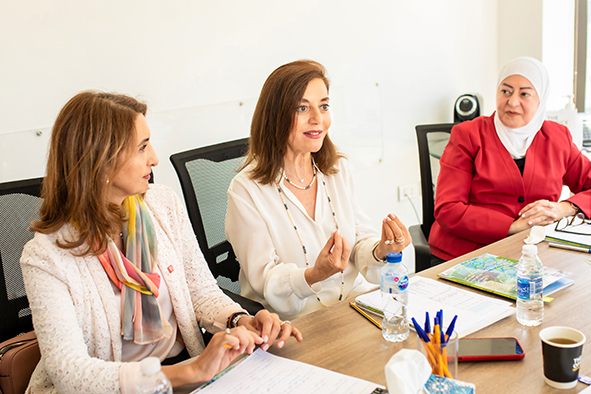By Hind-Lara Mango
Photos by Anastasia Casey
Al ‘Oun for Alzheimer’s Patient Care Association (AACA) and Al Marji’ Publications’ Family Flavours and Nakahat ‘Ailiyeh magazines teamed up to host a roundtable discussion about Alzheimer’s, commemorating World Alzheimer’s Month.
How can we change the culture of stigma toward dementia and Alzheimer’s? For Jordan’s Minister of Culture, Haifa Najjar, “Raising awareness in different areas, such as health, science and political life goes hand-in-hand with cultural sensitization.”
The Ministry of Culture is working on building a holistic and integral approach to culture to address these issues, Najjar adds.
Exploitation and money matters
Karim Kawar describes his experience with his father’s advanced Alzheimer’s as a “very painful experience.” A renowned businessman, Tawfik Kawar is now 95 years old and was diagnosed with memory loss 17 years ago. “Our father focused on his brain health as his mother, grandfather and grandmother’s sisters had Alzheimer’s. He worried about ending up having this disease.”
Unfortunately, there is no cure for Alzheimer’s and families of Alzheimer’s patients say that a lot of exploitation occurs at various levels.
Families interviewed stress the need to legally protect their loved ones from financial exploitation. “We had to protect our father and took legal action and responsibility to safeguard his property and finances,” shares Kawar.
Medicine is expensive, equipment is costly, care is expensive and patients with Alzheimer’s suffer from many medical conditions, which are also costly.
In Jordan, persons over 60 years of age are eligible for health insurance, but Alzheimer’s patients have specific medical needs that are not insured.
“So much money is being spent globally on research on other medical conditions, yet so little on Alzheimer’s,” says Kawar.
Support for loved ones
Families taking care of loved ones face mental, social and financial pressure as they try to cope with a parent with Alzheimer’s.
“We were lucky to have worked with two doctors who guided us when our father was diagnosed with Alzheimer’s,” says Lina Nuqul of her late father Elia Nuqul. Doctors met with family members, described what to expect in the coming years and advised how to protect their father from his physical environment.
“An Alzheimer’s patient goes through different stages including aggression,” notes Nuqul, a professional musician. And this is why she insisted on playing her music and her CDs for him, as music brought him respite.
AACA Jordan raises awareness and offers support for patients with Alzheimer’s and their families to improve the quality of life for people with dementia. “We currently have the dementia Friends Programme to address stigma in society associated with Alzheimer’s,” states AACA President Hamza Nouri. AACA hopes to translate this programme into Arabic and see it taught at schools and have various sectors trained. “Every three seconds, somebody is identified with dementia in the world,” says Nouri.
AACA recently became an official Alzheimer’s Disease International (ADI) member and a certified dementia Friend’s Global Programme member. “We are proud of this accomplishment and the training we started at schools and universities,” says Leen Madanat, AACA Treasurer. “But our biggest challenge is getting people to understand the seriousness, danger and cost of this disease,”
she adds. “We are a small team with big ideas and still have a lot of work ahead.”
Changing lives
For Nuqul, her father’s Alzheimer’s has turned her into a motivational speaker. She posts inspirational advice regularly on her LinkedIn account as she plays on the piano and sings, or reads inspirational quotes.
Her advice to others: “Don’t hide the fact that your loved one has Alzheimer’s; don’t be ashamed.”
Kawar believes that the community and government have important roles to play – the community to raise awareness about healthy lifestyles and the government to provide health care services for Alzheimer’s patients in their homes to live in dignity.
“We need a partnership among the public and private sectors and the community,” Najjar concludes.
True or False? Alzheimer’s is a natural outcome of ageing
Fact: As we age, our brains change, but Alzheimer’s disease and related dementias are not an inevitable part of ageing. Some Alzheimer’s patients are only 40 years old
Did you know? In Jordan, Alzheimer’s is more common in women
From those who have Alzheimer’s in Jordan, 56% are women and 44% are men,” discloses Arwa Najdawi, an expert in Jordan’s National Policy on Ageing. She explains that there is a direct correlation between the low participation of females in economic and political life and this disease.
“Men continue working and challenging their brains even as they age. Whereby the low percentage of women in the labour market and their lack of physical activity may trigger Alzheimer’s,” Najdawi states
Jordan stats: Alzheimer’s in numbers
Around 14% of the elderly in Jordan have Alzheimer’s, with the majority being females, according to a 2015 Jordanian Department of Statistics survey. The World Health Organisation defines senior citizens as those aged 60 years and above
Reducing the risk
Up to 40% of dementia cases may be prevented or delayed. Prevention comes from healthy nutrition, physical exercise, brain training games, reading books and magazines, maintaining an active social life and working.
“Early retirement is detrimental to Alzheimer’s”, stresses Najdawi. “Early retirement affects a person’s income and brain function,” she explains.
Nuqul believes there is a correlation between stress and Alzheimer’s. “Often, baba could not sleep, living in constant stress because of work and his sense of responsibility.” Nuqul also feels that his love of sugar and chocolate, in specific, was another contributing factor to his Alzheimer’s. Sugar intake may affect cognitive function over time, with higher amounts potentially increasing the risk for Alzheimer’s.
Kawar suspects that lack of sleep played a prominent role in triggering his father’s Alzheimer’s: “Our father used to boast of the fact that he used to sleep less than five hours and wake us all up at six o’clock in the morning full of energy.”
Have a loved one with Alzheimer’s?
For support and resources that help families and their loved ones suffering from Alzheimer’s, please get in touch with Al ‘Oun for Alzheimer’s Patient Care Association
at +962-799209504 or email [email protected]






